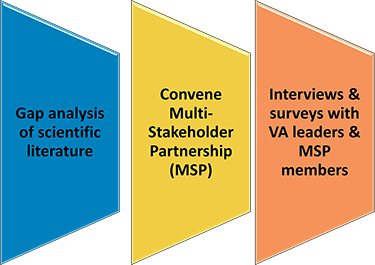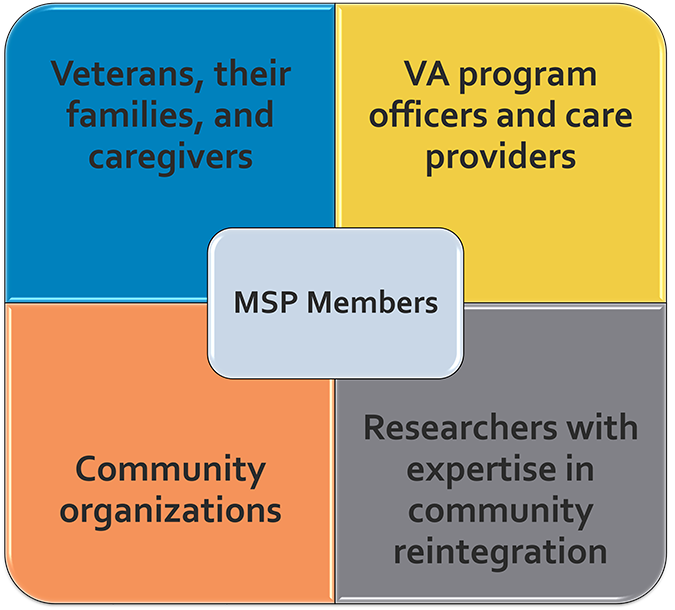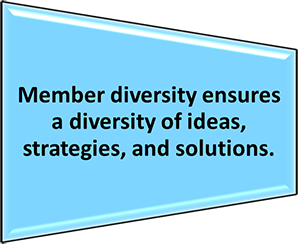 |
ENCORE: Working with Stakeholders to Improve the Impact of Veteran Community Reintegration ResearchHSR&D’s monthly publication Veterans’ Perspectives highlights research conducted by HSR&D and/or QUERI investigators, showcasing the importance of research for Veterans – and the importance of Veterans for research. In the July-August 2022 Issue: |
Introduction
ENCORE is a 5-year funded “Research to Impact for Veterans” (RIVR) project. The goal of this project is to improve VA policies, programs, and services that support Veteran community reintegration. Karen Besterman-Dahan, PhD, RD, is Principal Investigator. She is Qualitative Core Director of the James A Haley Veterans’ Hospital Research and Development Service in Tampa, FL.
Community reintegration is a dynamic process that involves resuming roles in one’s community of choice. For Veterans, that transition is usually their transition from military to civilian life or their journey following an injury or illness. Many Veterans struggle with day-to-day life after separation from military service1, affecting relationships, jobs, and health. Supporting Veteran community reintegration is a priority area of the Veterans Health Administration2, but research is needed to understand the community reintegration process. This includes improving the tools and methods used to collect data, involving more diverse Veteran populations in research, and quickly getting research results to the people that matter: Veterans, families, doctors, and policy makers. The Enhancing Veteran Community Reintegration Research (ENCORE) project was designed to create a VA research agenda to improve the impact of VA policies and programs that support Veteran community reintegration. Dr. Karen Besterman-Dahan and her team at the James A Haley VA Hospital and Clinics in Tampa, Florida work with Veterans, families, and caregivers, as well as VA program directors, researchers, and community organizations to prioritize research needs in this area. ENCORE understands community reintegration from many diverse viewpoints because all these people help with the work. This assures the research agenda is meaningful to everyone involved. Finding the Gaps and Enhancing Veteran Community Reintegration ResearchBuilding on earlier work to fill gaps in Veteran community reintegration research,3 ENCORE uses several methods to find gaps and research needs to meet the following objectives:

Working Together: Multi-Stakeholder Partnerships and Their BenefitsBecause Veteran community reintegration is complex, meaning different things to different people, finding solutions requires Veterans, their families, community organizations, policy makers, and researchers to all work together. Based on the principles of community engaged research,4 ENCORE created a Multi-stakeholder Partnership (MSP) to build collaborations between a diverse group of 25 individuals representing four types of partners:

ENCORE chose to build the MSP based on several important features. MSPs can be platforms that offer:

Creating a Roadmap to More Impactful Veteran Community Reintegration ResearchUsing virtual meetings and an external facilitator, the MSP and the ENCORE team adopted a Mission, Vision & Values statement to guide their work. Together they created the ENCORE research agenda for Veteran community reintegration that gives direction for greater impact of research on improving VA policies, programs, and services. This agenda:
Next StepsThis year, the MSP changed from large group meetings to smaller work groups that make products like infographics, presentations, and articles. More Veterans were recruited to participate in MSP workgroups and a separate ENCORE Veteran engagement group that reviews and gives feedback on all MSP workgroup and ENCORE products. ENCORE has plans for the MSP to provide guidance to VA researchers who want their work to align with the Veteran community reintegration research agenda. ENCORE is also working with VA to develop a website that makes the research agenda and other products available to researchers inside and outside of VA. References1) Henry M. Jackson Foundation for the Advancement of Military Medicine. The Veterans Metrics Initiative. 2022. 2) U.S. Department of Veterans Affairs. Department of Veterans Affairs Fiscal Years 2022-28 Strategic Plan. U.S. Department of Veterans Affairs. 2022. 3) Melillo, Downs, Dillahunt-Aspillaga, et al. Action Ethnography of Community Reintegration for Veterans and Military Service Members with TBI: a Mixed-Methods Study Protocol. JMIR Research Protocols. 2019. 4) Franco, Hooyer, Ruffalo et al. Veterans Health and Well-Being - Collaborative Research Approaches: toward Veteran Community Engagement. Journal of Humanistic Psychology, vol. 61, no. 3, pp. 287-312. 2021. |